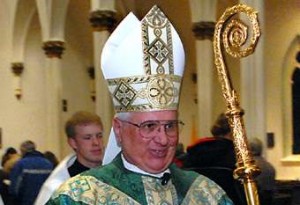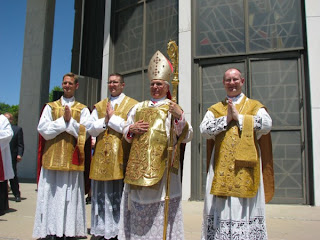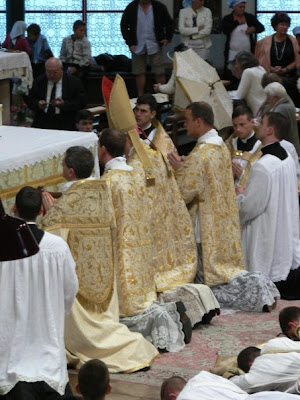(Omaha World-Herald) LINCOLN — Perhaps the story of Bishop Fabian Bruskewitz's 20-year watch over the Lincoln Diocese of the Roman Catholic Church could be told as a parable of two men.
Both were trained as priests at a select seminary in Rome, their time there overlapping during the late 1950s and early 1960s.
The slightly older priest revered church tradition as a living connection between believers and Jesus Christ, established through a succession of priests tracing back to St. Peter himself. That priest, a Milwaukee native ordained in 1960, has had a storied career and went on to become the eighth bishop of Lincoln.
The younger man visualized the church as a champion of social justice, embracing all people and ending discrimination. John Krejci, a South Omaha native ordained in 1962, grew disillusioned. He left the priesthood in 1971 to become a professor of social work.
Three decades later, Bruskewitz and Krejci crossed paths again in Lincoln. Their clash of values ended with Bruskewitz excommunicating Krejci and other local members of a Catholic reform group known as Call to Action.
One of their strongest areas of contention: the role of women and girls in worship services.
Under Bruskewitz's leadership, the Lincoln Diocese remains the last in the United States to prohibit girls from being altar servers. Krejci not only would like to see altar girls, he wants the church to consider married priests and female priests and seeks more discussion of matters such as birth control and same-sex marriage.
As Bruskewitz nears the end of his time as bishop, the 15-year battle over the two opposing concepts of Catholicism is a signature theme of his tenure. It is a battle that helped win him a national reputation as a traditionalist among the nation's 65 million Catholics.
In a recent interview, Bruskewitz said his duty is to preserve Catholic faith, "unmutilated, undiluted and undistorted."
"Relativism is a great danger," he said. "There is such a thing as truth."
***
Reverence for tradition would not be the only defining characteristic of Bruskewitz's tenure, of course.
Bruskewitz turned 75 in September 2010 and, as required by church law, submitted his letter of resignation. Ordained as Lincoln's bishop in May 1992, he will step down once Pope Benedict XVI names his successor, likely within the year.
Now the oldest-serving bishop in the United States, Bruskewitz in effect serves as chief executive officer of the Diocese of Lincoln, a territory covering Nebraska from border to border south of the Platte River.
By many measures, his Lincoln career has been one of accomplishment. Church membership has grown, the parochial schools are strong, new seminaries and convents have been established, social services have been expanded, and church finances are solid.
"His influence has been profound," said Doug Curry, a retired executive with the Lincoln Electric System and a member of St. Michael Church, a fast-growing parish in southeast Lincoln.
Bruskewitz set in motion the first ever diocesewide fund drive in 1999, raising $28 million to support Catholic schools, priests' retirement, a new seminary and other projects.
Five new Catholic grade schools and five new parishes have been established, including Lincoln's Cristo Rey Church, a predominantly Hispanic congregation, and St. Andrew Dung-Lac, a predominantly Vietnamese congregation. St. Michael School, which opened in August 2011, is the newest Catholic elementary school in the state.
 "The Lord has blessed us," Bruskewitz said in a recent interview. "I don't take any credit. Good things happen because of God's grace."
"The Lord has blessed us," Bruskewitz said in a recent interview. "I don't take any credit. Good things happen because of God's grace."***
Since Bruskewitz became bishop, the number of Catholics in the diocese has grown from about 80,000 to more than 95,000.
A number of factors contributed to the growth, including an influx of Hispanic and other immigrants and new Catholic converts. But some Catholics have moved into the diocese because of its emphasis on tradition.
Paul Lewandowski and his wife, Terri, have lived in five dioceses, including in the Chicago area, Denver and Birmingham, Ala., and returned to Nebraska 11 years ago. Paul Lewandowski, an aviation professional, took a job at Lincoln's Duncan Aviation in part because of the Lincoln Diocese's reputation.
"You hear about it all over the United States and all over the world that Lincoln is a strong or devout diocese," he said. "You hear good things — that it's Rome in the United States. Or you hear bad things — it's so conservative or it's stuffy and there's no freedom."
He finds the Lincoln Diocese's emphasis on tradition to be reassuring — proof that the Catholic faith has been handed down generation to generation from Jesus.
 He even likes that the diocese prohibits altar girls: "The role of altar boy is one reserved for preparation for the priesthood. It sets up boys to become men who serve."
He even likes that the diocese prohibits altar girls: "The role of altar boy is one reserved for preparation for the priesthood. It sets up boys to become men who serve."Lewandowski said that when his family lived in Chicago, waiting lists and cost prevented him and his wife from placing their six children in Catholic school. Rather than enroll them in public school, they home-schooled.
That leads him to another major benefit of the Lincoln Diocese: the affordability of parochial school education. Bruskewitz's policy requires churches to contribute to the cost of educating children from their parish.
Senior year tuition at Lincoln's Pius X High School costs $1,800. For comparison, senior year tuition at Omaha Skutt High School is $8,325.
"It makes it so affordable, you can't afford not to send your kids to Catholic school," Lewandowski said.
***
Patty Hawk is not among those attracted to the traditionalism of the Lincoln Diocese.
The 48-year-old assistant professor of communication studies at Nebraska Wesleyan University moved to the Lincoln area from Chadron, Neb., in 1985. Growing up, she helped serve Holy Communion at her parish church and deliver it to shut-ins. She was disappointed to find that women aren't allowed to do that in the Lincoln Diocese.
 |
She became attracted to Call to Action in the early 1990s because of its goals of giving women and lay people more leadership opportunities. She joined the group's Lincoln chapter soon after it was formed in 1996.
As Call to Action was being organized, however, Bruskewitz warned that the group's beliefs were incompatible with church doctrine. Those who joined it anyway would be excommunicated and barred from receiving Communion.
***
Other than the absence of altar girls, the differences between a Catholic Mass in a Lincoln Diocese church and one in another diocese are subtle, almost imperceptible to the uninitiated.
Lincoln Catholics note that the language used to consecrate the bread and wine for Communion precisely follows the liturgical text of the Roman Missal, in one example.
The tabernacle, used to house Communion wafers after they have been consecrated, is always at the highest place in the church.
They say some churches in other dioceses may be more relaxed on those points.
 Some churches in the Lincoln Diocese, though not all, tap women to read Scripture and to lead prayers from the pulpit.
Some churches in the Lincoln Diocese, though not all, tap women to read Scripture and to lead prayers from the pulpit.The differences may be more obvious in the school system. The row of young priests attending football games at Pius X High School. The nun teachers who wear their habits in the classroom. The daily Mass at the elementary schools.
Those factors, Catholics say, contribute to the high number of young people who decide to enter the priesthood or join a convent. A 2006 study by Catholic World Report cited the Diocese of Lincoln as having the highest per-capita number of seminarians in the country.
During Bruskewitz's tenure, 67 men in the diocese have been ordained as priests. About 35 of them graduated from the St. Gregory the Great Seminary in Seward, Neb., which Bruskewitz helped establish in 1998.
The Rev. Steve Thomlison, once a political campaign consultant who helped conservative Jon Christensen unseat then-U.S. Rep. Peter Hoagland in 1994 in the 2nd District, left the hard-hitting world of politics in 2003 to study for the priesthood.
Thomlison, who was ordained in 2010, said he found his calling in part because Bruskewitz fostered an especially welcoming environment for priests.
Bruskewitz stresses the fundamentals for his priests, Thomlison said, much as a basketball coach who drills his athletes on the basics so they can excel on game day.
"He is this great lion that cares for us and protects us."
***
 Sandy Danek, the president of Nebraska Right to Life, converted to Catholicism after her marriage more than 30 years ago. One of her sons is studying for the priesthood at the Seward seminary.
Sandy Danek, the president of Nebraska Right to Life, converted to Catholicism after her marriage more than 30 years ago. One of her sons is studying for the priesthood at the Seward seminary."He's just a delightful, delightful person," she said of Bruskewitz.
She disputes that the diocese stifles women.
"I'm so busy that some days I don't know how I could do much more," she said.
In addition to her anti-abortion involvement, she serves as a cantor, or song leader, for Mass and helped start a ministry for grieving people more than 20 years ago.
Last week, at least a half-dozen girls participated in a Mass presided over by Bruskewitz at St. Michael School.
Some read Scripture and led prayers. Fifth-graders Maggie Stamper and Grace Gokie concluded the service with thank-yous for parents and volunteers and a report to the bishop that students had offered up hundreds of prayers for him.
But only boys aided the priests as they prepared and served Communion.
"I believe gender equality is not the same thing as gender interchangeability," Bruskewitz said, adding that "the most splendid creature God ever made was Mary, who gave Jesus flesh to redeem us."
As the mother of four grown sons and a grown daughter, Danek said she accepts the diocese's policy that only boys can be altar servers because it has helped cultivate more priests in the diocese. Her son Timothy has told her that serving as an altar boy led him to decide to be a priest.
"Some would call it conservative; I would call it orthodoxy," she said of Bruskewitz's philosophy. "That strength in leadership is doing amazing things."
***
It is not unusual for the bishop to take a hard-nosed position.
He refused to participate in a voluntary annual audit of diocesan policies against child sexual abuse requested by the U.S. Conference of Catholic Bishops.
In an interview, he said he sees no purpose to the audit.
Incidents of abuse are "vile, they damage people for life. Few things are more horrible. They require immediate action, and it is a crime not to report them."
In recent weeks, Bruskewitz made headlines again, issuing a blistering letter calling for Catholics in the diocese to fight a federal ruling requiring insurance coverage for birth control, female sterilization procedures and the morning-after pill.
The letter is part of a nationwide effort by U.S. Catholic bishops to oppose the requirement included in the federal health care law.
In his letter, Bruskewitz referred to Health and Human Services Secretary Kathleen Sebelius as a "bitter fallen-away Catholic" and urged Catholics to be prepared to incur heavy fines or imprisonment if necessary to oppose the measure, which affects religious-run social service agencies.
In an interview, Bruskewitz said he views it as a matter of religious freedom, not politics.
"This is a requirement that requires me to pay for something that happens in my view to be completely immoral," he said. "It's a distortion of the land of the free, and they know it."
***
The showdown with Call to Action occurred not long after Bruskewitz's arrival in Lincoln. The group was one of a dozen that Bruskewitz identified as antithetical to Catholic teachings. Others included the pro-suicide Hemlock Society, Planned Parenthood, the Freemasons and its affiliated organizations, and even an ultra-conservative Catholic organization that followed pre-Vatican II precepts without the pope's authorization.
It was the Call to Action group that attracted the most attention, however.
The organization is fairly small, with about 50 active members in the diocese. Its members say their goal is to strengthen the church, not undermine it, and they object strenuously to being denied Communion.
Krejci on occasion simply has taken the bread, despite attempts by priests to wave him off. As recently as last year, he said, priests in the diocese were sent reminder letters that they should not knowingly provide Communion to Call to Action members.
Many members travel outside the diocese to receive Communion.
It's a matter that causes some anguish for Jim McShane, a retired English professor from the University of Nebraska-Lincoln.
It reached a crisis point several weeks ago as McShane prepared for surgery to repair a stroke-like injury on the surface of his brain. He did not know whether he would be alive or fully functioning afterward.
 His excommunication put him in a position, he said, "where if you were to die, you'd be damned to hell," he said. "This is an unsettling prospect."
His excommunication put him in a position, he said, "where if you were to die, you'd be damned to hell," he said. "This is an unsettling prospect."Yet to be restored to the sacraments, he would have to renounce Call to Action.
"That causes me to assert something I do not believe is true," McShane said.
"My resolution is to say that one must trust the justice of God," he said. "So I do."
***
Bruskewitz expresses no second thoughts about the controversial decisions that have marked his tenure and dismisses labels like "conservative" or "authoritarian" as political words that don't fit religious leaders.
Asked whether he found it sorrowful to deny Communion to believers, he said it was more sorrowful for errant Catholics to put their priests in an uncomfortable position.
Bruskewitz said he finds it a tragedy that his one-time fellow seminarian now leads an "anti-Catholic sect."
"Their creed does not resemble the Catholic Church," he said. "If they want to walk their own way, let them walk their own way."




No comments:
Post a Comment